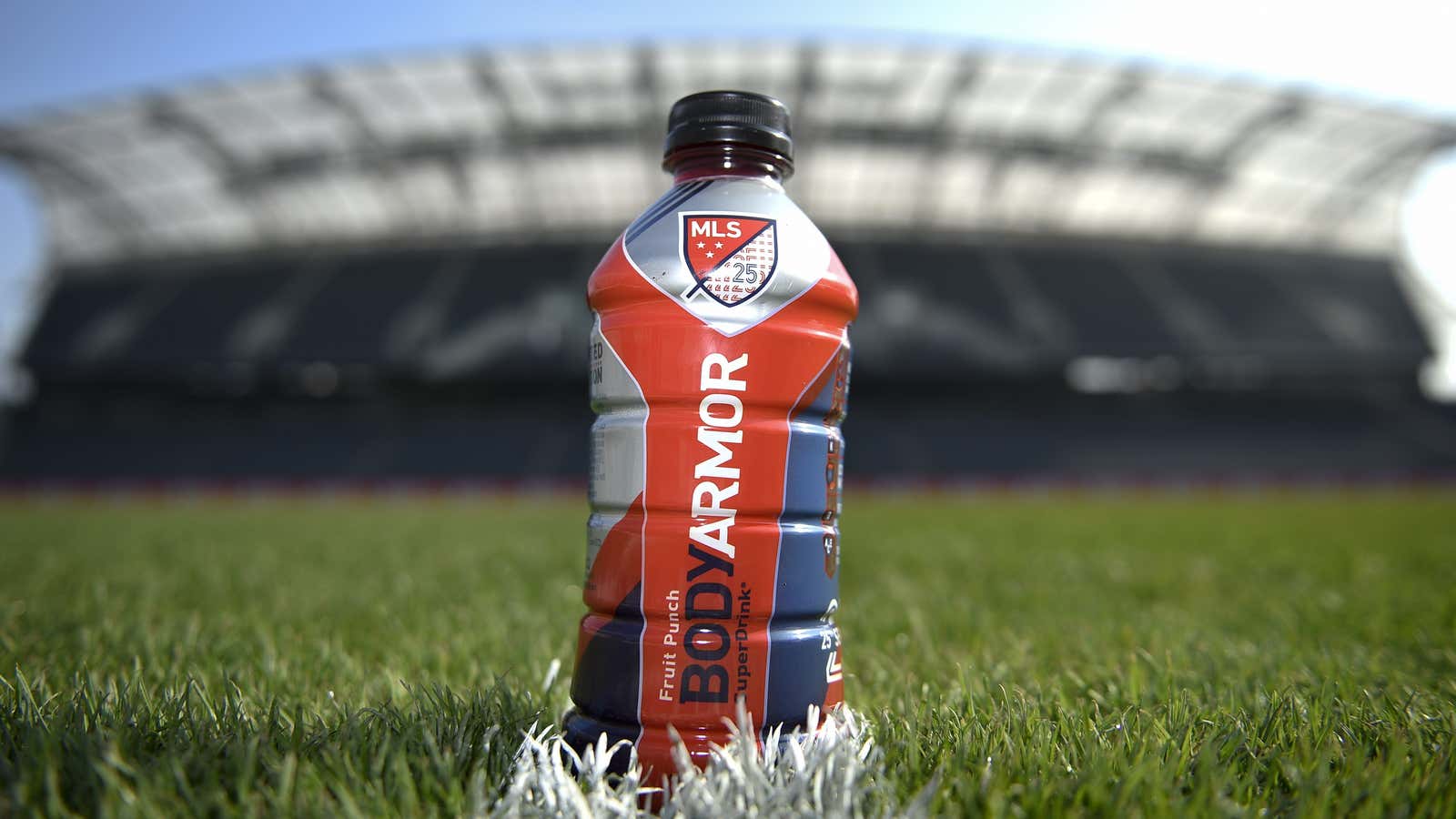Coca-Cola is taking aim at the Gatorade brand owned by its arch-rival Pepsi by buying BodyArmor.
Coke, which already owns 30% of the sports drink, is spending $5.6 billion to gain total control of the brand, the Wall Street Journal reported. The deal values BodyArmor at $8 billion.
The beverage giant is set to buy the remaining stake in BodyArmor from the company’s founders and investors, as well as a group of professional athletes including the National Basketball Association’s James Harden and Major League Baseball’s Mike Trout. It’s Coke’s biggest acquisition since its $5.1 billion purchase of Costa Coffee acquisition in 2018.
BodyArmor’s “natural” advantange
BodyArmor positions its products as a “natural” alternative to the likes of Gatorade and even Coca-Cola’s own Powerade through its use of coconut water, low sodium and high potassium levels, absence of artificial colors, and use of sugar in place of high fructose corn syrup.
Additionally, the roster of celebrity athletes endorsing the brand from Harden and Trout to Naomi Osaka and the late Kobe Bryant lend the brand credibility. Its multi-year deal with Major League Soccer from 2019 not only puts its drinks in the limelight, but its logo is also on towels and kits. Recent campaigns starring country singer Carrie Underwood marked the brand’s first attempt to find popularity beyond the world of sports.
BodyArmor was founded in 2011 by Mike Repole and Lance Collins. In 2018, when Coca-Cola first invested in the company, sales were about $250. Since then its sales have increased more than 43% year-on-year to top $1 billion in February 2021. Combined with Powerade, BodyArmor will give Coca-Cola a 22% share of the US sports drink market.
Chipping away at Gatorade’s legacy
PepsiCo’s Gatorade, which was first developed in 1965, is still the market leader, capturing over two-thirds of the US market.
Powerade, which Coca-Cola introduced as a Gatorade rival in 1992, offered competition for some time in the early 2000s but quickly slipped. Meanwhile, Gatorade has stayed on top of its game by innovating and bolstering its product pipeline, moving with the times by offering drinks with no calories and less sugar, among other things.
With the BodyArmor deal, Coca-Cola has another chance to squeeze Gatorade in the growing market. Coke could “sandwich” Gatorade by offering BodyArmor at a premium price and Powerade at a discount price, Duane Stanford, editor of Beverage Digest, told marketing news agency the Drum.
For Coca-Cola, the deal has “the potential to invigorate the company’s sports drink business and stoke growth across the portfolio,” Wells Fargo analyst Bonnoe Herzog says.
Of sports drinks, coffees, and alcohol
The war with Gatorade is bigger than sports drinks.
The BodyArmor deal is part of a broader shift away from carbonated beverages—an urgent need given that Classic Coke sales have plummeted 22% in the last decade.
When CEO James Quincey took the reins at Coke in 2017, he said he wanted it to become a “total beverage company.”
Since then, Coca-Cola has acquired Costa Coffee, premium sparkling mineral water brand Topo Chico, and dairy brand Fairlife. It is also started testing the waters in the alcohol segment.
Not all its experiments have paid off. Energy, launched to rival energy drink Monster was retired within a year owing to poor sales. Coca-Cola sold off Zico coconut water and Odwalla juice, and ended production of its first-ever diet cola, Tab, as part of its plan to shutter 200 brands globally and focus on the more profitable, faster-growing products in its portfolio.
But the BodyArmor deal is proof that its diversification efforts are far from over.
